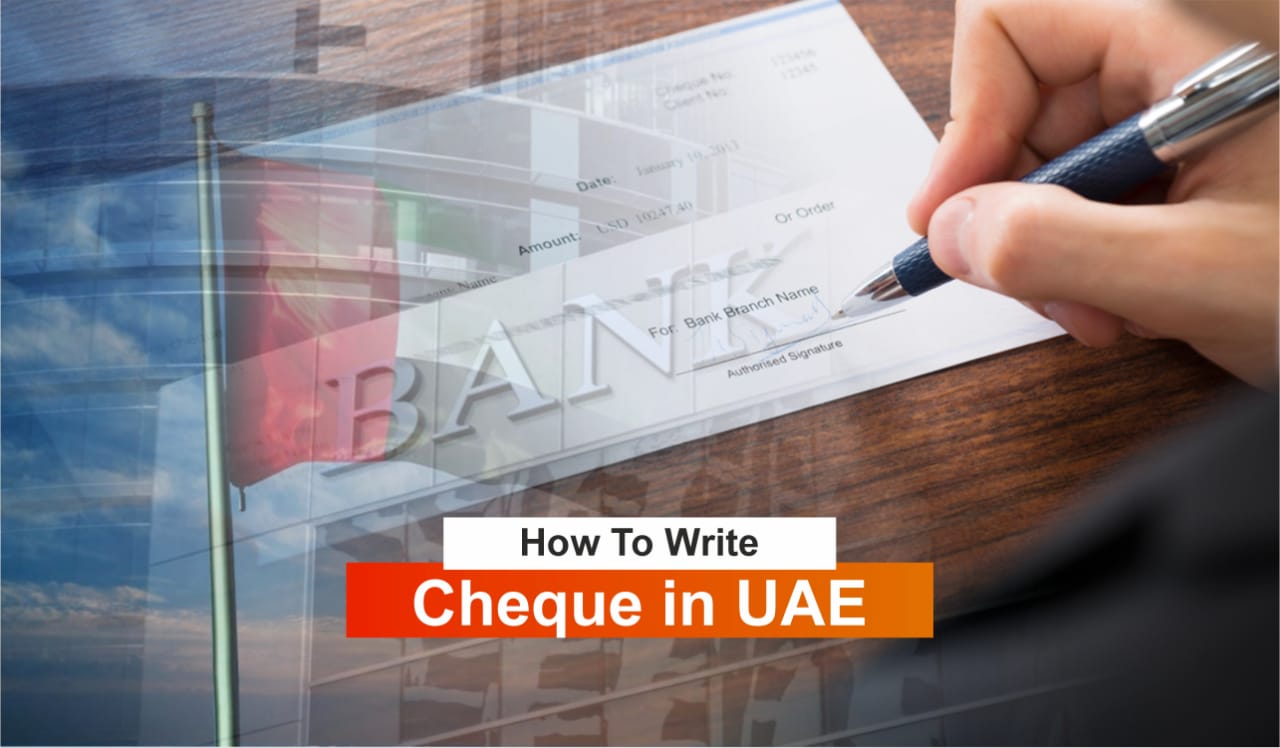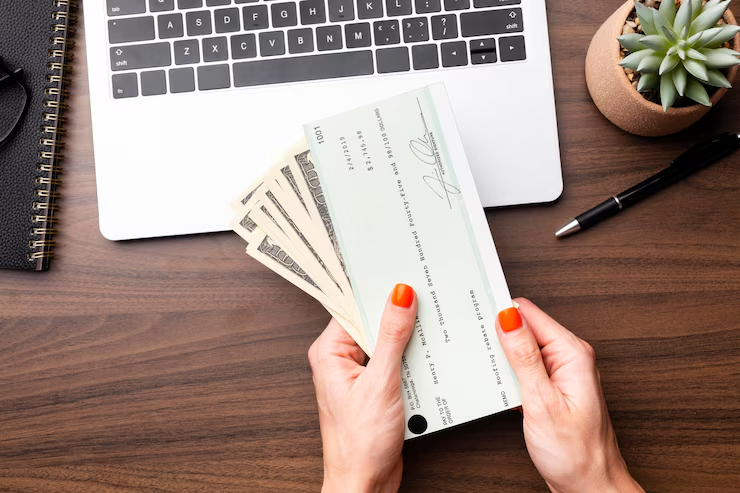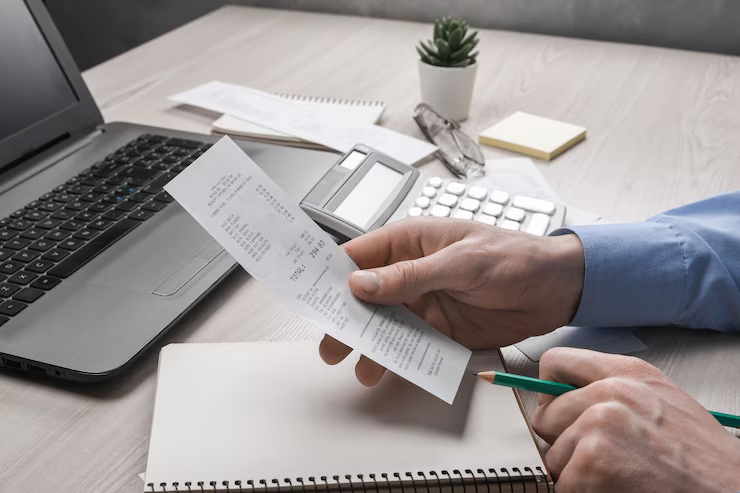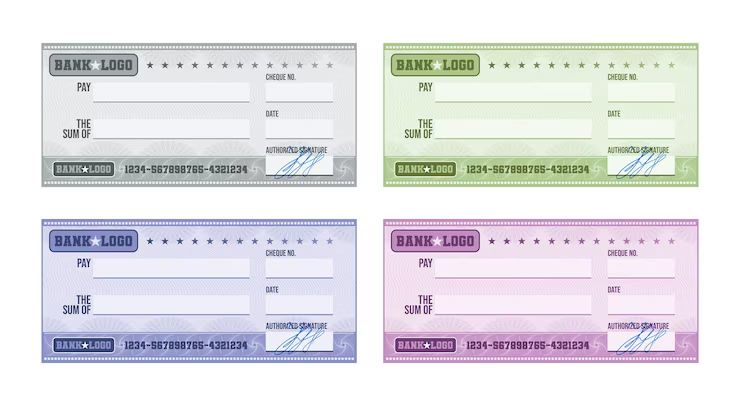
While living in the UAE, you’re dealing with money and writing a cheque for money to be cashed. But how to write cheque in UAE (valid & proper)? That’s what matters!
For writing a cheque in UAE, write the proper date, payee’s name, and correct figures of the amount (in numbers & words). Errors, overwriting, and corrections are not allowed. This is just an overview. Let’s go into detail!
This article will cover everything you need to know about ”how to write cheque in UAE”. Let’s start without delay!
Table of Contents
How To Write Cheque In UAE (Valid)?
Follow the following step-by-step process for writing a valid cheque:
Write The Date
Start by writing the date. Ensure that you write the proper and correct date (in the top right corner) for valid results. Here is a standard format for writing a date: DD/MM/YYYY Or MM/DD/YYYY. Note: (this format may be changed as per the bank’s requirements)
Write The payee’s Name
On the cheque, a line starts with “Pay to the order of”. On this line, write the full and proper name of a person or a company receiving the cheque. Make sure to write correct spelling as it may reject your cheque.
Write The Amount In Numbers
On the cheque, a box is given for writing the amount. In it, write the proper amount of money in numbers with the currency of UAE like AED. Don’t leave space between numbers as someone can change your amount.
For instance: 50,000.00 AED (Make sure to include two decimal places for fills, even if it’s a round amount).
Write The Amount In Words
On the cheque, below the payee’s name, a line is drawn to write the amount in words. Write the amount here in words using the “Only” word at the end. (This word is used to prevent fraud).
For instance: Fifty Thousand Dirhams Only
Sign The Cheque
After filling the whole cheque, Now there’s the time to sign the cheque. Make sure to use the same signature style that your bank wants to avoid any delays.
Memo Line (Optional)
Some banks offer a line on the cheque to write a memo (mention the purpose), such as “rent payments”, loan installments, personal transactions, etc.”

Key Tips To Remember While Writing A Cheque
- Avoid spelling mistakes and overwriting.
- Avoid pencils; always use a blue or black pen to write a cheque.
- Sign the cheque according to the bank’s requirements.
- Remember that, you can’t cash the post-dated cheques before the mentioned date.
- Before issuing an amount, make sure that you have a certain amount in your account to prevent a bounced cheque.
- Safeguard your cheque book for security measures.
Mistakes You Should Avoid While Writing A Cheque
Which mistakes make your cheque invalid? Let’s know here!
Fill-properly
Always sign the cheque after filling it properly. But If your cheque is for a financial institution as a security cheque then Okay (you can sign) without filling.
No Alterations
Avoid altering your cheque and use clear handwriting. If you need to make any changes to your cheque, destroy it and write again on the new cheque.
Cheque Your Account
Before issuing the amount by cheque, make sure that you have the same amount in your account as bounced cheques can lead to hard penalties and hefty pains.
Ensure Saftey
For safety or protection, write “account payee” on the left corner of the cheque and draw two parallel lines on the cheque. It means that now cheques can only be cashed in the specified person’s bank account and not can be cashed over the counter.
Don’t Write On The MICR
For processing cheques, MICR (magnetic ink character recognition) is essential. Don’t write, paste, or staple anything on things to prevent rejection.
Unused Cheque
If you want to cancel an unused cheque, MICR band properly and write the word “cancel” on the front of the cheque.

What Makes A Cheque Valid?
When you receive a cheque, make sure that it has the following characteristics:
- The word “cheque” is written clearly.
- The name of the bank from which you can cash it.
- The payee’s name (who it is payable to)
- Signature of the person who wrote the cheque
- Correct MICR without any band
- Do not take the expired cheque from anyone (a cheque is valid for 6 months after the date written on it).
- The specific amount (which you want to take) is written clearly.

Types Of Cheques
In the United Arab Emirates, you can use four types of cheques. Let’s know which are they!
Self Cheque
Issued with yourself and allowing the account holder to withdraw cash.
Cash/Bareer Cheque
Can be cashed by anyone who presents it in the bank. It’s risky if lost.
Order Cheque
This cheque is only cashed by the person whose name is written on it.
Account Payee Cheque
Marked with “A/C Payee Only” and must be deposited into the recipient’s bank account.
Post-dated Cheque
Issued with a future date and cannot be cashed until that date (commonly used for rent and loans).
Stale Cheque
This cheque is more than 6 months old from the written date and cannot be cashed.
Blank Cheque
A cheque that is signed without any details is often used as a security deposit, but it’s risky.

Common Uses Of Cheques in UAE
Cheques are commonly used for the following purposes:
- Rent payments: Post-dated cheques (PDCs) are commonly used for rental payments to landlords.
- Loan and credit card payments: Banks often require security cheques for loans or credit cards.
- Business transactions: Companies use cheques for large payments and supplier transactions.
- Personal transactions: Individuals use cheques instead of large sums of cash for gifting large amounts or personal transactions.
- Salary payments: Some businesses issue cheques for employee salaries instead of direct transfers.
- Property purchases: Real estate transactions often involve cheque payments.
- Security deposits: Many service providers and landlords require a security cheque for guarantees.
- Government transactions: Some government fees and payments are made via cheque.
FAQs About: How To Write Cheque In UAE
- What is the validity of the cheque?
The cheque is valid for 6 months from the date that it is written on it. After that, it becomes invalid or expired and cannot be cashed.
- I need a new cheque book immediately; can I come to the bank and get one immediately?
No! You can’t get a chequebook immediately unless you apply to the bank. After that, you will receive it within 4 to 5 working days.
- How safe are cheques?
Cheques are generally safe but can be vulnerable to fraud, theft, and forgery. Using secure banking methods like online transfers is often safer.



Leave a Reply